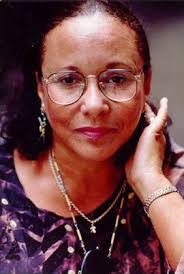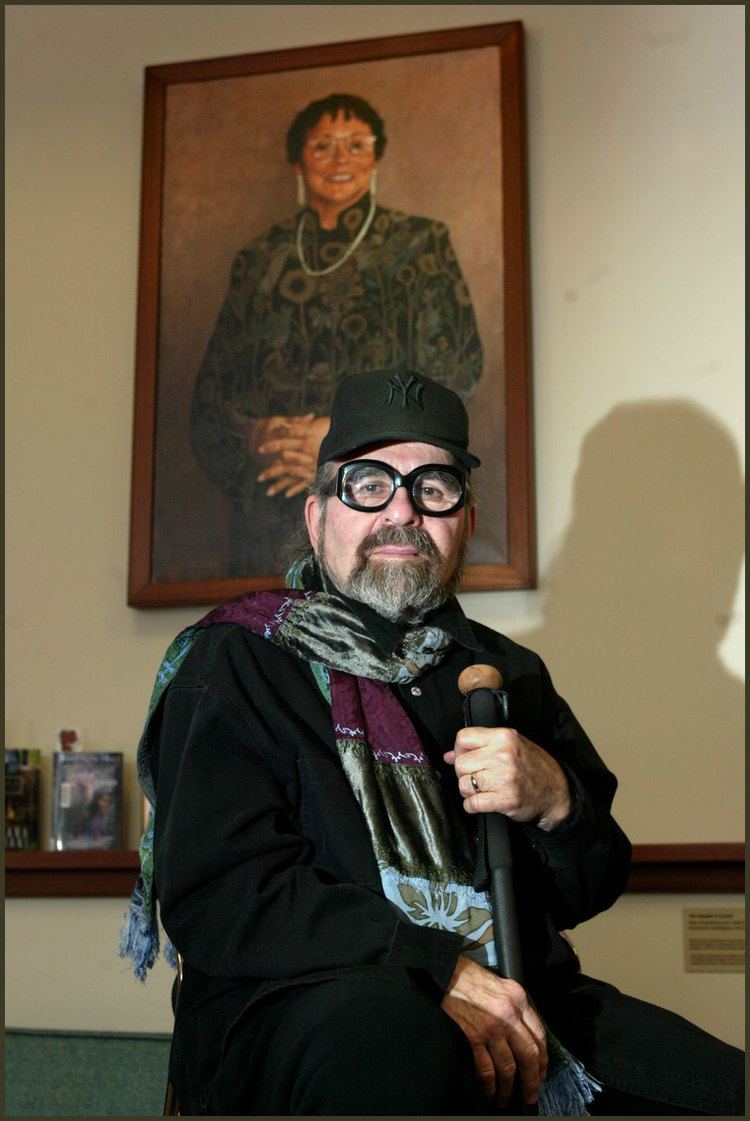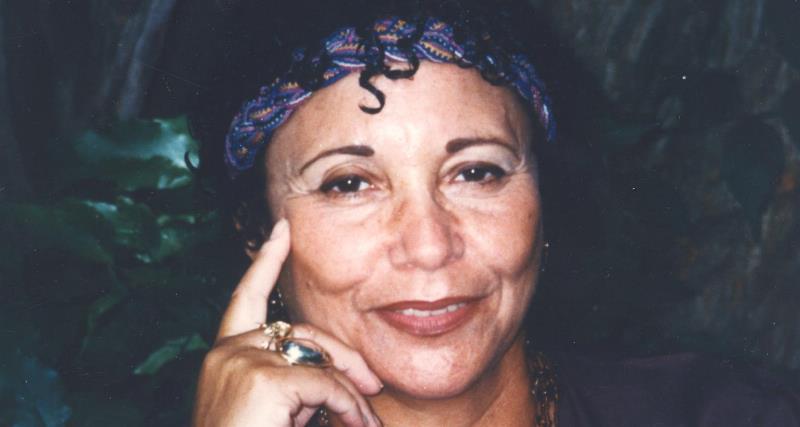“Her legacy is so even beyond her works … its … of trying to help other authors to have their works published … of creating incredible stories for children who that were unlike any works previously and unlike many works that are out there today.
~ Julie Rubini, Author
Born on March 12, 1934, Virginia Esther Hamilton was born to Kenneth and Etta Belle (née Perry) Hamilton in Yellow Springs, Ohio. The land upon which she was reared with her four older siblings had been in her mother’s family since the 1850s when her grandfather, Levi Perry, had been brought into Ohio. As an infant, he was carried on the Underground Railroad into Ohio, a free state.
Growing up with extended family in the rural area of southwestern Ohio greatly influenced Virginia. A bright child, she was strongly encouraged and supported to read and write. Hamilton excelled so academically, it led her to graduate at the top of her class and earn a full-scholarship to Antioch College, a local institution of higher learning. She transferred, in 1956, to the Ohio State University, where she majored in creative writing and literature.
Two years later, she moved to New York City, where she worked a variety of positions, including as a museum receptionist. In developing herself to become a published author, she studied fiction writing at the New School for Social Research under the guidance of Hiram Haydn, a founder of Atheneum Press.
Pursuing her dream, Virginia Hamilton also fell in love with poet, Arnold Adoff. The son of Jewish immigrants, Adoff was raised in South Bronx and earned his Bachelor of Arts degree in history and literature from City College of New York. In the article, “The Literary and Local Legacy of Virginia Hamilton and Arnold Adoff” by Jocelyn Robinson, he described his meeting her, saying, “It was beyond love at first sight. It was cosmic and spiritual and everything that I didn’t even know existed at the time. Two days later, I went to have dinner with my mother up in the Bronx on the way to the National Guard armory where I was a member of the guard and she said what’s new and I said I met this woman, she’s Black and I’m going to marry her, and that was the end of the conversation as far as I was concerned. As far as they were concerned, it was another cause for bringing in psychiatrists, etc., etc., etc.”
In 1960, Adoff and Hamilton married and for a brief time, they lived in Europe. They returned to New York City, where he taught social studies in schools in Harlem and on the Upper West Side, and she wrote, perfecting her craft. After they had their daughter, Leigh, in 1963, and son, Jamie, in 1967, they decided to return to Yellow Springs and live on the Perry-Hamilton family land. This move to Ohio was a wise decision that extended beyond familial ties. Yellow Springs has historically been known for its cultural diversity. Also, with the explosion of The Civil Rights, Black Power and Black Arts Movements, the social and political conversations placed Blacks in a greater locus of power, presence and self-determination. These all benefitted Hamilton and Adoff, as he asserted in the aforementioned article, “ … things began to open up in America for non-mainstream groups, because of agitation and activity, Blacks becoming more visible, people talking about the White problem rather than the Black problem, we were there, and we were ready, and I had my anthologies, Virginia her novels and the publishing industry was rolling and expanding.”

(No copyright infringement intended).
The same year that Jaime was born, Zeely, the first novel of Virginia Hamilton, was published. The story centers on the summer visit of Elizabeth and John Perry to the farm of their Uncle Ross. As part of the magic of the siblings’ adventure, Elizabeth gives them both nicknames, “Geeder” and “Toeboy”. While they are excited about spending time on the farm, what entrances the children most is their uncle’s neighbor, Zeely Tayber, whose carriage prompts them to believe she descends from royalty. Scholastic describes the work as a “… female initiation story, Geeder Perry and her brother, Toeboy, go to their uncle’s farm for the summer and encounter a six-and-a-half-foot tall Watusi queen and a mysterious night traveler.”
Designated an American Library Association (ALA) Notable Book, Zeely won the Nancy Bloch Award. Unlike previous novels that dealt with the trials and sufferings of being Black, Hamilton wrote “liberation literature”, books that emphasized the extraordinary in ordinary African-Americans. According to her biography at virginiahamilton.com, Virginia Hamilton “…wrote and published forty-one books in multiple genres that spanned picture books and folktales, mysteries and science fiction, realistic novels and biography. Woven into her books is a deep concern with memory, tradition, and generational legacy, especially as they define the lives of African Americans.”
After the publishing of Zeely, her next novel, The House of Dies Drear (1968), won the Edgar Allan Poe Award for Best Juvenile Mystery. In 1971, her novel, The Planet of Junior Brown, won the Lewis Carroll Shelf Award and was named a Newberry Honor Book; that novel was developed into a film. Released in 1997, it starred Martin Villafana, Margot Kidder Clark Johnson and Lynn Whitfield, who won a NAACP Image Award for her performance.
However, it would be in 1974 that life for Hamilton would forever be changed. Her novel, M.C. Higgins, the Great, received rave reviews and praises, causing her to win the prestigious Newberry Medal. The novel centers upon African-American teenager, Mayo Cornelius Higgins, “M.C.” for short, and his life on Sarah’s Mountain, fictionally set in Kentucky, near the Ohio River. His community is being encroached by a coal mining company that threatens to destroy their traditions, customs and mores of life.
In her win for this novel, Virginia Hamilton made history, as she was the first Black author to receive the medal. M.C. Higgins, the Great also won the National Book Award; the Coretta Scott King Award; the Lewis Carroll Shelf Award; the Peace Prize of Germany; The Boston Globe-Horn Book Award and was designated “Outstanding Children’s Book of the Year” by The New York Times. The novel’s trifecta wins of the Newberry Medal, the National Book Award and The Boston Globe-Horn Book Award is an extremely rare occurrence!
Virginia Hamilton continued to create and win many accolades and awards throughout her life. These honors include a MacArthur Fellowship from the John D. and Catherine T. MacArthur Foundation; the Laura Ingalls Wilder Award; and the Regina Medal for her “continued, distinguished contribution to children’s literature” by the Catholic Library Association. She received the Hans Christian Andersen Award for Writing, the highest international award given to an author or illustrator of children’s literature.
On February 19, 2002, Virginia Hamilton passed away in Dayton, Ohio. Three of her books, Bruh Rabbit and the Tar Baby Girl (2003), Wee Winnie Witch’s Skinny (2004), and Virginia Hamilton: Speeches, Essays, and Conversations, edited by Arnold Adoff and Kacy Cook (2010), have been released posthumously. Their daughter lives in Berlin, Germany and their son, also an award-winning author, and Adoff still live in Yellow Springs.

(No copyright infringement intended).
The incredible and immensely creative contributions of Virginia Hamilton are beloved by many. Regarding her pioneering impact and enormous influence, Dr. Sharon Lynette Jones, director, African and African American Studies at Wright State University stated, “… Virginia Hamilton was truly groundbreaking … the way in which her work engages class, race, gender and other elements really has set up a foundation for a lot of contemporary writers.”
“I don’t think you can, if you’re a Black writer writing about Black subject matter, that you can stop from being symbolic. It just simply happens.”
~ Virginia Hamilton



